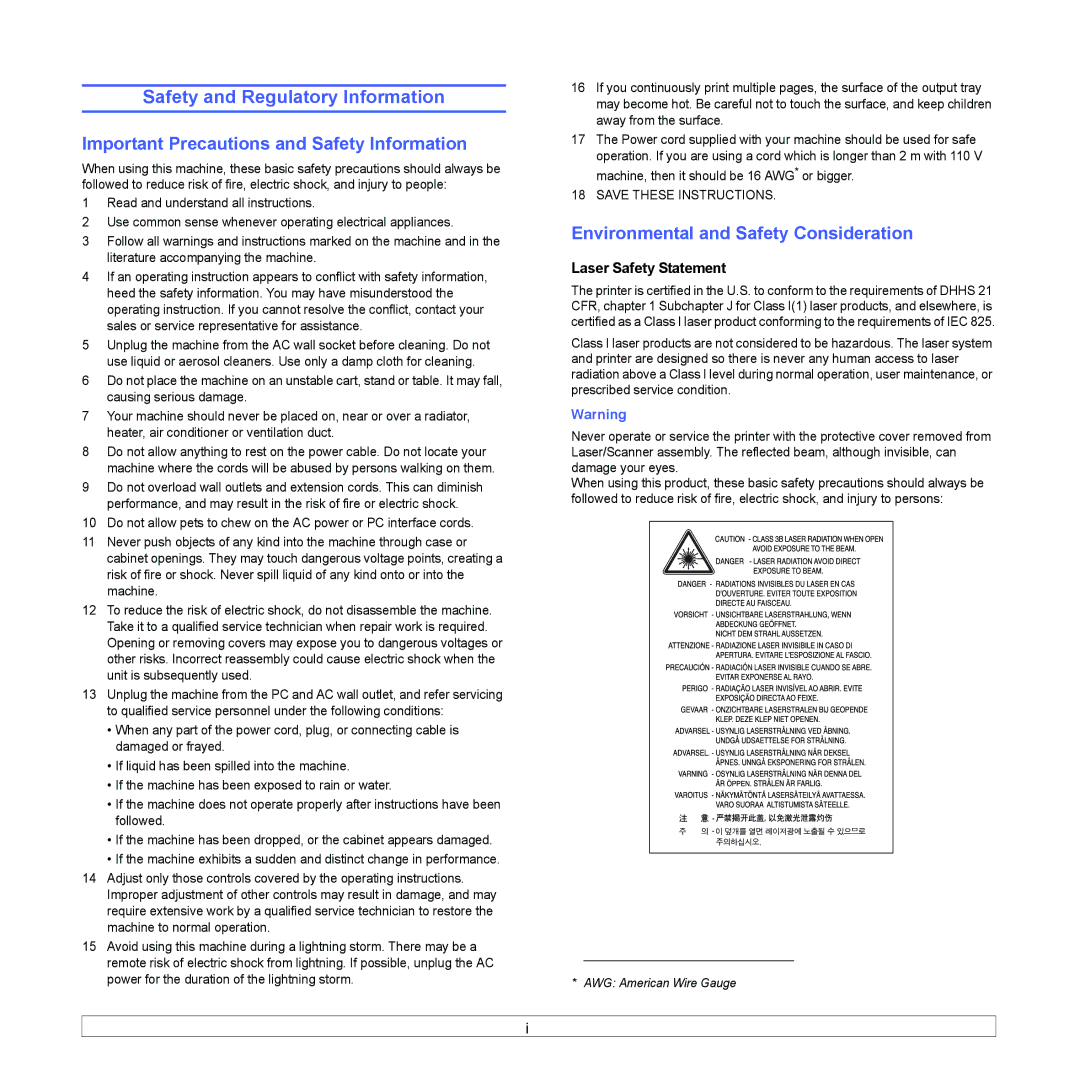
Safety and Regulatory Information
Important Precautions and Safety Information
When using this machine, these basic safety precautions should always be followed to reduce risk of fire, electric shock, and injury to people:
1Read and understand all instructions.
2Use common sense whenever operating electrical appliances.
3Follow all warnings and instructions marked on the machine and in the literature accompanying the machine.
4If an operating instruction appears to conflict with safety information, heed the safety information. You may have misunderstood the operating instruction. If you cannot resolve the conflict, contact your sales or service representative for assistance.
5Unplug the machine from the AC wall socket before cleaning. Do not use liquid or aerosol cleaners. Use only a damp cloth for cleaning.
6Do not place the machine on an unstable cart, stand or table. It may fall, causing serious damage.
7Your machine should never be placed on, near or over a radiator, heater, air conditioner or ventilation duct.
8Do not allow anything to rest on the power cable. Do not locate your machine where the cords will be abused by persons walking on them.
9Do not overload wall outlets and extension cords. This can diminish performance, and may result in the risk of fire or electric shock.
10Do not allow pets to chew on the AC power or PC interface cords.
11Never push objects of any kind into the machine through case or cabinet openings. They may touch dangerous voltage points, creating a risk of fire or shock. Never spill liquid of any kind onto or into the machine.
12To reduce the risk of electric shock, do not disassemble the machine. Take it to a qualified service technician when repair work is required. Opening or removing covers may expose you to dangerous voltages or other risks. Incorrect reassembly could cause electric shock when the unit is subsequently used.
13Unplug the machine from the PC and AC wall outlet, and refer servicing to qualified service personnel under the following conditions:
•When any part of the power cord, plug, or connecting cable is damaged or frayed.
•If liquid has been spilled into the machine.
•If the machine has been exposed to rain or water.
•If the machine does not operate properly after instructions have been followed.
•If the machine has been dropped, or the cabinet appears damaged.
•If the machine exhibits a sudden and distinct change in performance.
14Adjust only those controls covered by the operating instructions. Improper adjustment of other controls may result in damage, and may require extensive work by a qualified service technician to restore the machine to normal operation.
15Avoid using this machine during a lightning storm. There may be a remote risk of electric shock from lightning. If possible, unplug the AC power for the duration of the lightning storm.
16If you continuously print multiple pages, the surface of the output tray may become hot. Be careful not to touch the surface, and keep children away from the surface.
17The Power cord supplied with your machine should be used for safe operation. If you are using a cord which is longer than 2 m with 110 V machine, then it should be 16 AWG* or bigger.
18SAVE THESE INSTRUCTIONS.
Environmental and Safety Consideration
Laser Safety Statement
The printer is certified in the U.S. to conform to the requirements of DHHS 21 CFR, chapter 1 Subchapter J for Class I(1) laser products, and elsewhere, is certified as a Class I laser product conforming to the requirements of IEC 825.
Class I laser products are not considered to be hazardous. The laser system and printer are designed so there is never any human access to laser radiation above a Class I level during normal operation, user maintenance, or prescribed service condition.
Warning
Never operate or service the printer with the protective cover removed from Laser/Scanner assembly. The reflected beam, although invisible, can damage your eyes.
When using this product, these basic safety precautions should always be followed to reduce risk of fire, electric shock, and injury to persons:
* AWG: American Wire Gauge
i
